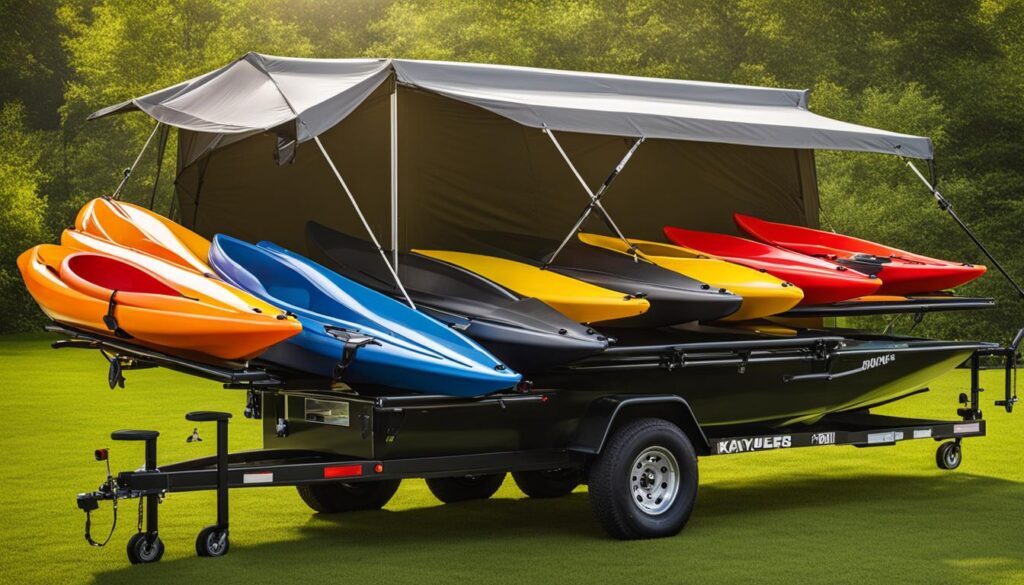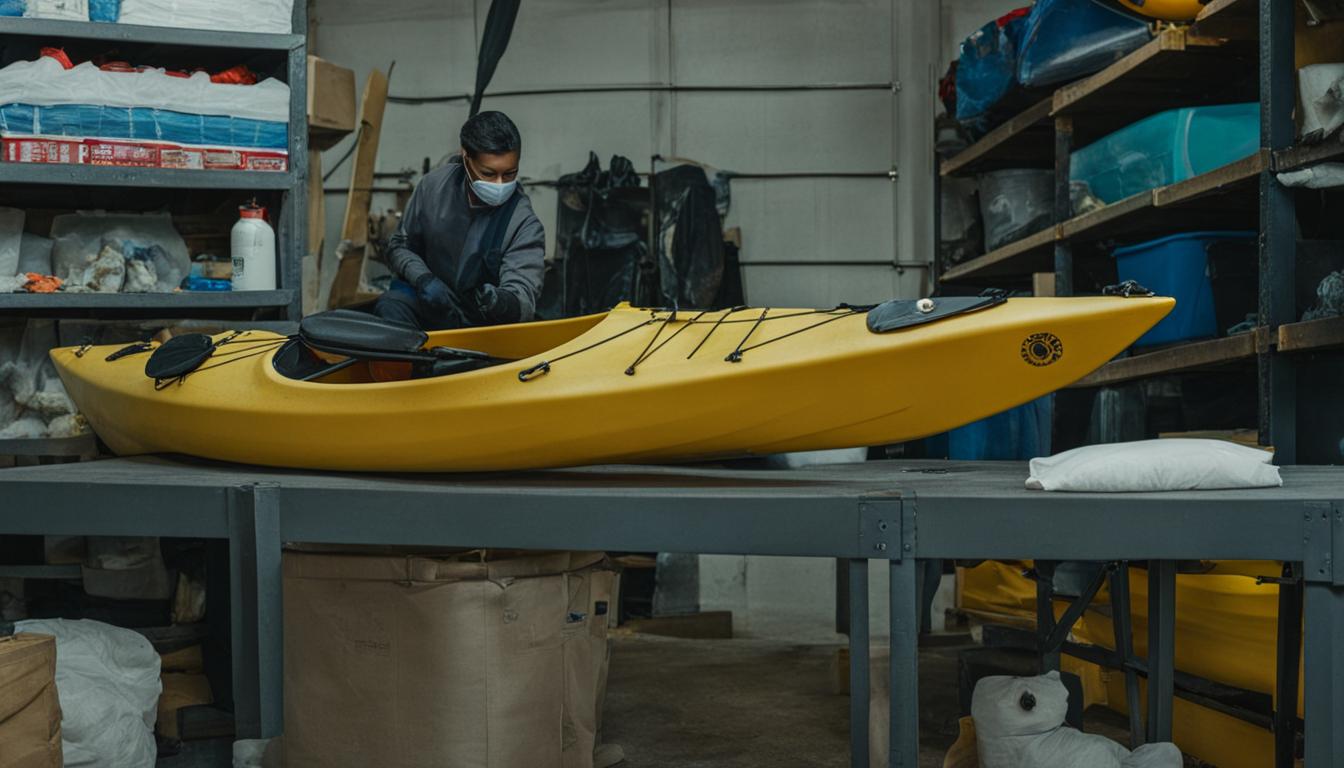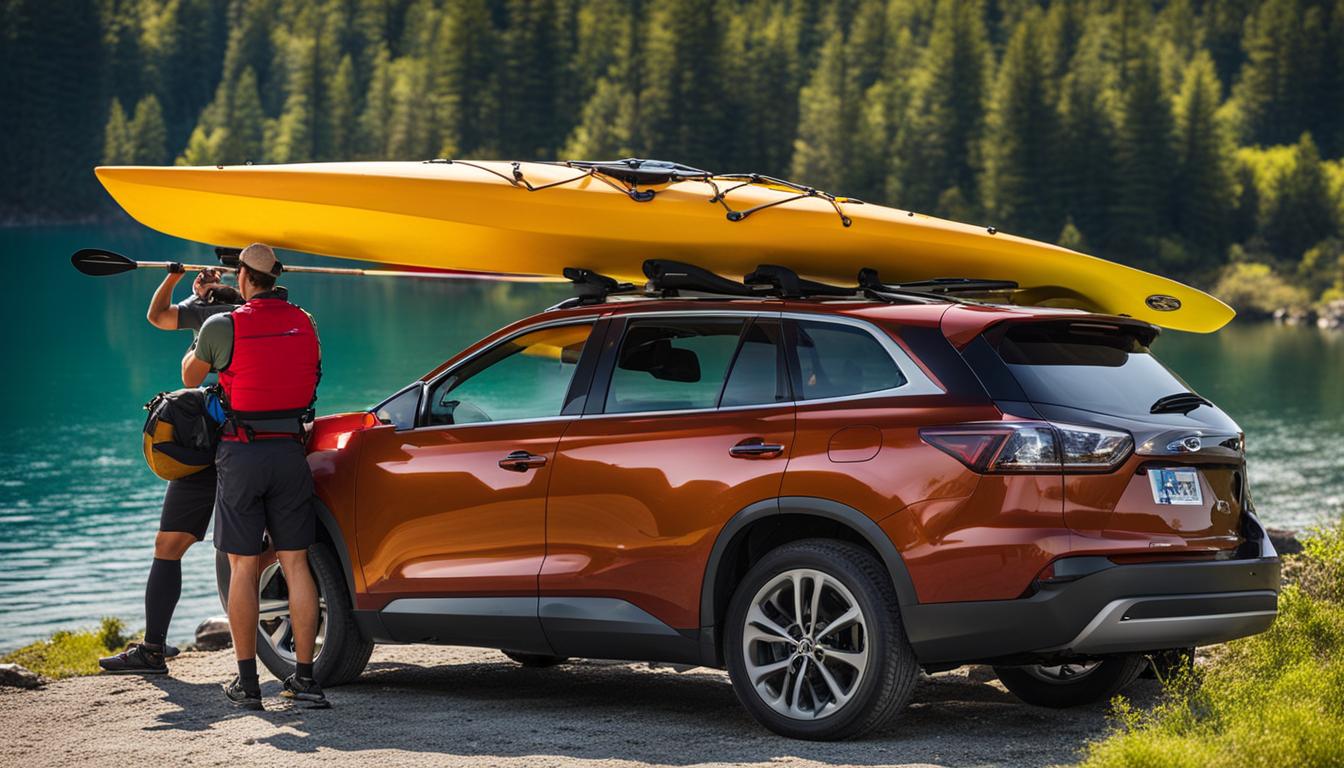When it comes to transporting your kayak, the age-old debate remains: should you use a trailer or a roof rack? Let’s dive into the pros and cons of each option to help you decide which method is best for you and your trusty vessel.
Key Takeaways:
- Comparing kayak trailers and roof racks can help you make the right choice for your needs.
- Kayak trailers offer benefits such as easier loading, maneuverability, and durability.
- Roof racks are a more affordable and space-efficient option for transporting kayaks.
- Consider personal preference, budget, and convenience when deciding between a roof rack and a trailer.
- Efficiency of kayak transport varies between roof racks and trailers, with trailers offering smoother rides and the ability to carry multiple kayaks.
The Pros and Cons of Using a Trailer for Kayak Transport
When it comes to transporting your kayak, using a trailer can offer a range of advantages. Let’s take a look at the pros and cons of using a trailer for kayak transport:
Advantages of Kayak Trailers
- Easier Loading: Kayak trailers typically have ramps or mechanisms that make it easier to load and unload your kayaks, saving you time and effort.
- Maneuverability: Trailers provide better maneuverability compared to roof racks. They have wheels and can be easily towed, allowing you to navigate tight spaces or maneuver around obstacles with ease.
- Customization Options: Many trailers can be customized to accommodate multiple kayaks or different types of watercraft. This flexibility makes it easier to transport your kayaks along with other outdoor gear.
- Durability: Kayak trailers are designed to withstand rough road conditions and provide a secure transport solution. They often have sturdy frames, tie-down points, and other features to ensure your kayaks remain stable during travel.
Disadvantages of Kayak Trailers
- Additional Storage Space: Trailers require storage space when not in use. If you have limited space or live in an apartment or condominium, finding a suitable storage solution for your trailer can be a challenge.
- Upfront Cost: Investing in a kayak trailer can be more expensive than purchasing a roof rack. However, the long-term benefits and convenience they offer may outweigh the initial cost.
- Towing Capacity: It’s important to ensure that your vehicle has the towing capacity necessary to tow a kayak trailer. This may require additional equipment or modifications to your vehicle.
Overall, using a trailer for kayak transport provides several advantages such as easier loading, maneuverability, customization options, and durability. However, it’s important to consider the additional storage space required and the upfront cost. If you have the means and storage space, a trailer can be an excellent choice for hassle-free kayak transport.

| Advantages | Disadvantages | |
|---|---|---|
| Easier Loading | ✔ | |
| Maneuverability | ✔ | |
| Customization Options | ✔ | |
| Durability | ✔ | |
| Additional Storage Space | ✔ | |
| Upfront Cost | ✔ | |
| Towing Capacity | ✔ |
The Pros and Cons of Using a Roof Rack for Kayak Transport
Roof racks are a popular choice for kayak transport due to their convenience and cost-effectiveness. However, it’s important to consider the disadvantages they may present. One of the main drawbacks of using a roof rack is the physical effort required to load and unload the kayak. Lifting a heavy kayak onto the roof of your vehicle can be challenging and potentially risky, especially if you’re doing it alone. This can be particularly difficult for individuals with limited strength or mobility.
Another disadvantage of using a roof rack is the potential for damage to your kayak or vehicle. Improperly securing the kayak to the roof rack can cause it to shift during transportation, leading to scratches or dents on both the kayak and the vehicle. Additionally, the exposed position of the kayak on the roof rack makes it more susceptible to damage from wind, debris, and low-hanging branches. This can result in costly repairs or the need for frequent kayak maintenance.
When considering the use of a roof rack for kayak transport, it’s also important to note the impact on vehicle aerodynamics and fuel efficiency. The bulk and height of a kayak on the roof rack can create additional wind resistance, which can decrease fuel efficiency and potentially increase road noise. This is especially true when driving at higher speeds or in windy conditions. It’s important to be aware of these potential drawbacks and consider whether they outweigh the convenience and cost-effectiveness of using a roof rack.
Table: Pros and Cons of Using a Roof Rack for Kayak Transport
| Pros | Cons |
|---|---|
| Cost-effective option | Physical effort required for loading and unloading |
| Convenient for vehicles without towing capabilities | Potential for damage to kayak and vehicle |
| Can be used on multiple vehicles | Decreased vehicle aerodynamics and fuel efficiency |
Considering Personal Preference, Budget, and Convenience
When it comes to choosing between a roof rack and a trailer for transporting your kayaks, personal preference, budget, and convenience play a crucial role. While both options have their advantages and disadvantages, your decision ultimately depends on what works best for you. Let’s explore these factors in more detail.
Personal Preference
Your personal preference is an important aspect to consider when deciding between a roof rack and a trailer. Some kayakers may prefer the simplicity and convenience of a roof rack, as it allows for easy loading and unloading of their kayaks. Others may prefer the added capacity and flexibility of a trailer, especially if they need to transport multiple kayaks or other equipment.
Budget
Another important consideration is your budget. Roof racks generally tend to be more affordable compared to trailers. They are a cost-effective solution for kayakers who only need to transport one or two kayaks and can be easily installed on most vehicles without the need for any additional equipment. On the other hand, trailers require a higher upfront investment, but they offer long-term value, especially for those who frequently transport their kayaks or have larger kayaking needs.
Convenience
Convenience is a key factor when it comes to choosing between a roof rack and a trailer. Roof racks offer the advantage of not requiring any additional storage space when not in use. They are also more space-efficient, allowing you to utilize the interior of your vehicle for other gear or passengers. However, loading and unloading kayaks from a roof rack can be physically demanding and potentially risky, especially if you have a larger or heavier kayak. Trailers, on the other hand, provide easier loading and unloading, making them a convenient option for individuals who value efficiency and ease of use.
| Roof Rack | Trailer | |
|---|---|---|
| Cost | Affordable | Higher upfront investment |
| Capacity | Limited (1-2 kayaks) | Can carry multiple kayaks |
| Convenience | Space-efficient | Easier loading and unloading |
| Flexibility | Less flexible | More flexibility for different equipment |
At the end of the day, the choice between a roof rack and a trailer depends on your personal needs and preferences. Consider factors such as the number of kayaks you need to transport, your budget, and your level of convenience. Whether you opt for a foldable kayak trailer for multiple kayaks or a space-saving roof rack, the most important thing is that you can safely and efficiently transport your kayaks to your next adventure.

Efficiency Comparison: Roof Rack vs Trailer
When considering the efficiency of transporting kayaks, it is important to compare the performance of roof racks and trailers. Roof racks have the advantage of a lower upfront cost and minimal storage space requirements. However, they may result in decreased fuel efficiency due to increased wind resistance. On the other hand, trailers offer a smoother ride, enhanced aerodynamics, and the capability to transport multiple kayaks without significantly impacting fuel economy.
Roof racks are a popular choice for those who only need to transport one or two kayaks. They are more cost-effective and space-efficient, making them suitable for individuals with budget constraints or limited storage options. However, it is important to note that loading and unloading kayaks onto roof racks can be physically demanding and potentially risky, especially for those without sufficient upper body strength or adequate assistance.
Trailers, such as the GO EASY by SylvanSport, provide a more comfortable and secure option for kayak transport. These custom kayak trailers are specifically designed to carry large loads and offer better maneuverability. They provide convenience and ease of use, allowing for faster loading and unloading of kayaks. Additionally, trailers have enhanced aerodynamics, resulting in a smoother ride and less wind resistance compared to roof racks. This can lead to improved fuel efficiency, especially for longer distances and when transporting multiple kayaks.
| Aspect | Roof Rack | Trailer |
|---|---|---|
| Ease of Loading and Unloading | Physically demanding and potentially risky, especially for individuals without sufficient upper body strength or assistance. | Faster and easier loading and unloading, providing convenience and ease of use. |
| Storage Space | Minimal storage space required. | Additional storage space required for the trailer. |
| Fuel Efficiency | Increased wind resistance may lead to decreased fuel efficiency. | Enhanced aerodynamics result in improved fuel efficiency, especially for longer distances and when transporting multiple kayaks. |
| Capacity | Typically suitable for transporting one or two kayaks. | Ability to transport multiple kayaks. |
Ultimately, the choice between a roof rack and a trailer depends on personal preference, budget, and convenience. Roof racks offer a cost-effective and space-efficient solution for those who only need to transport a few kayaks, while trailers provide a more comfortable, secure, and durable option, especially for individuals who frequently transport kayaks or multiple vessels. Consider your specific needs and weigh the advantages and disadvantages of each option before making a decision.
Conclusion
In conclusion, the debate between using a roof rack or a trailer for kayak transport ultimately comes down to personal preference and individual needs. Both options have their benefits and disadvantages that should be considered before making a decision.
If you value easier loading, maneuverability, and durability, a kayak trailer might be the better choice for you. Kayak trailers offer the advantage of being able to easily load and unload your kayak, making the process more convenient and less physically demanding. They also provide added durability and stability during transport.
On the other hand, if budget and space efficiency are your main concerns, a roof rack may be the more suitable option. Roof racks are typically more affordable and take up minimal storage space when not in use. However, it’s important to note that loading and unloading a kayak from a roof rack can be physically demanding and potentially risky.
Ultimately, the decision between a roof rack and a trailer depends on your priorities. Consider the benefits of kayak trailers, such as easier loading and maneuverability, as well as the disadvantages of roof racks, such as physical exertion and potential risks. By weighing these factors and considering your budget and storage space, you can make the best choice for your kayak transport needs.
FAQ
What are the pros of using a trailer for kayak transport?
Trailers are designed for carrying large loads, making them a suitable option for transporting kayaks. Some pros of using a trailer include easier loading, maneuverability, and durability.
What are the pros of using a roof rack for kayak transport?
Roof racks are a popular choice for kayak transport. Some pros of using a roof rack include affordability and space efficiency. They are a great option for those who only need to transport one or two kayaks.
Which option is better for kayak transport, a trailer or a roof rack?
There is no definitive answer as the choice between a trailer and a roof rack depends on individual needs and preferences. Kayak trailers offer benefits such as easier loading and durability, but require additional storage space and upfront cost. Roof racks are a more affordable and space-efficient option but can be physically demanding and potentially risky during loading and unloading.
Are kayak trailers or roof racks more fuel-efficient?
Kayak trailers like the GO EASY by SylvanSport offer enhanced aerodynamics and smoother rides, which can potentially improve fuel efficiency. On the other hand, roof racks may decrease fuel efficiency due to increased wind resistance.
Can kayak trailers carry multiple kayaks?
Yes, kayak trailers like the GO EASY have the ability to carry multiple kayaks, making them a great choice for those who need to transport more than one vessel.





